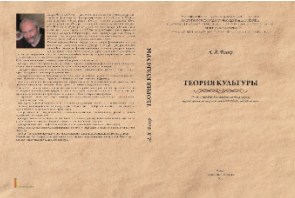НАУЧНО-ОБРАЗОВАТЕЛЬНОЕ КУЛЬТУРОЛОГИЧЕСКОЕ ОБЩЕСТВО
НАУЧНАЯ АССОЦИАЦИЯ ИССЛЕДОВАТЕЛЕЙ КУЛЬТУРЫ
Научное рецензируемое периодическое электронное издание
Выходит с 2014 г.

Гипотезы:
ТЕОРИЯ КУЛЬТУРЫ
А.Я. Флиер. Системная модель социальных функций культуры
Дискуссии:
В ПОИСКЕ СМЫСЛА ИСТОРИИ И КУЛЬТУРЫ (рубрика А.Я. Флиера)
А.В. Костина, А.Я. Флиер. Тернарная функциональная модель культуры (продолжение)
В.М. Розин. Особенности и конституирование музыкальной реальности
Н.А. Хренов. Русская культура рубежа XIX-XX вв.: гностический «ренессанс» в контексте символизма (продолжение)
Аналитика:
КУЛЬТУРОЛОГИЧЕСКИЕ РАЗМЫШЛЕНИЯ
И.В. Кондаков. Кот как культурный герой: от Кота в сапогах – до Кота Шрёдингера
Н.А. Хренов. Спустя столетие: трагический опыт советской культуры (продолжение)
И.Э. Исакас. Гипотеза. Рождественская ёлка – символ второго пришествия Христа
ДУЭЛЬ
А.Я. Флиер. Неизбежна ли культура? (о границах социальной полезности культуры) (Философская антиутопия)
А.А. Пелипенко. Культура как неизбежность (о субъектном статусе культуры)


Флиер А. Я.
Теория культуры: учебное пособие для студентов-бакалавров, обучающихся по направлению 033000 «Культурология». — М.: ООО «Издательство «Согласие», 2019. — 328 с.
Учебное пособие подготовлено в соответствии с требованиями Федерального образовательного стандарта и содержит основные положения теории культуры, соответствующие современному научному пониманию предмета, сущности культуры, ее функций, морфологии и типологии, динамики, форм, антропологических и социальных свойств.
Учебное пособие предназначено для студентов-бакалавров вузов, обучающихся по направлению «Культурология».
Оглавление
Предисловие
Глава 1. Сущность культуры
Определения культуры
Культура как социальная система
Культурные процессы
1. Культура как нормативное социальное поведение
Обычаи как социальный ритуал
Нравы
2. Культура как символическая деятельность
Язык
Мифология и религия
Искусство
3.Культура как основание идентичности
Типология доминантных идентичностей
Субъекты идентификации
Культурные аспекты самоидентификации
Глава 2. Функции культуры
Свойства человека, обеспечивающие функциональные возможности культуры
1. Главные социальные функции культуры
Функциональная дифференциация человеческих коллективов
Социальная консолидация
Социокультурная организация
Социокультурная регуляция
Социокультурная коммуникация
Культурная адаптация
Культурная самоидентификация
Познание и систематизация знаний
2. Накопление и трансляция социального опыта.
Социокультурное воспроизводство
Социализация и инкультурация личности
Образование
Глава 3. Морфология и типология культуры
1. Структурирование культуры по основным сферам
жизнедеятельности людей (морфология культуры)
2. Структурирование культуры по социальным стратам общества
(социально-сословная типология)
Субкультура сельских материальных производителей (крестьянская)
Субкультура городских материальных производителей (буржуазная)
Субкультура городских интеллектуальных производителей (интеллигентская).
Субкультура производителей порядка (элитарная)
Субкультура нарушителей порядка (криминальная)
3. Структурирование культуры
по ее социально-функциональным специализациям
Кровнородственный тип культуры
Этнический тип культуры
Национально-политический тип культуры
Конфессиональный тип культуры
Профессиональный тип культуры
4. Структурирование культуры по способам социальной регуляции
Традиционная культура (культура-обычай)
Креативная культура (культура-идеология)
Массовая культура (культура-референция)
Глава 4. Динамика культуры
1. Происхождение культуры
Культурогенез и его особенности
Происхождение орудийной деятельности
Происхождение языка
Происхождение религии
Происхождение изобразительной деятельности
Переход к производящему сельскому хозяйству и ремеслу
Происхождение креативной деятельности
Происхождение письменности
Истоки культурного многообразия человечества
2. Историческое развитие культуры
История культуры как история деятельности
Культура эпохи первобытности (эколого-генетическая стадия развития)
Культура аграрной эпохи (политико-идеологическая стадия развития)
Культура индустриальной эпохи (экономико-социальная стадия развития)
Культура постиндустриальной эпохи
(информационно-либералистская стадия развития)
3.Вектор развития культуры
Место культуры в процессе эволюции жизни на Земле
Культурное будущее человечества
Основные тенденции исторической динамики культуры
Глава 5. Формы культуры
Культурные формы, артефакты, черты
Культурные системы
Культурные конфигурации
1. Локальные культуры
Культуры народов
Субкультуры
2. Транслокальные культуры
Цивилизации
Хозяйственно-культурные типы
Культурно-этнографические общности
Конфессиональные общности
3. Социальные типы культуры
Культурное пространство
Культурный институт
Культурные нормы
Культурные традиции
4. Языки культуры
Культурные тексты
Культурные интерпретации
Культурная картина мира
Глава 6. Культура человека и культура общества
1. Место человека в культуре
Человек как продукт культуры
Человек как потребитель культуры
Человек как транслятор культуры
Человек как творец культуры
2. Культурные интересы и потребности человека
Культурные роли человека
Культурная адекватность
Социальная престижность и социокультурные притязания
Культурные ценности
Культурная компетенция
3. Общество как культурная система
Культурное устроение общества
Воспроизводство образа и качества жизни человека и общества
Заключение.
Культура в социальной реальности
Приложение. Теория культуры. Философские пролегомены
Методическое приложение. Вопросы для самопроверки
Рекомендуемая литература
Основная литература
Дополнительная литература

ISSN 2311-3723
Учредитель:
ООО Издательство «Согласие»
Издатель:
Научная ассоциация
исследователей культуры
№ государственной
регистрации ЭЛ № ФС 77 – 56414 от 11.12.2013
Журнал индексируется:
Выходит 4 раза в год только в электронном виде
Номер готовили:
Главный редактор
А.Я. Флиер
Шеф-редактор
Т.В. Глазкова
Руководитель IT-центра
А.В. Лукьянов
Наш баннер:

Наш e-mail:
cultschool@gmail.com
НАШИ ПАРТНЁРЫ:
Мнение редакции может не совпадать с мнением авторов.
При полном или частичном использовании материалов ссылка на «Культуру культуры» обязательна.
© Научная ассоциация исследователей культуры, 2014-2024







